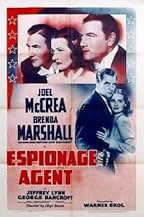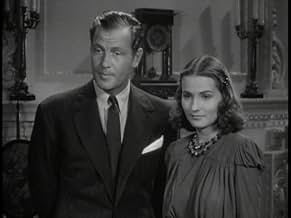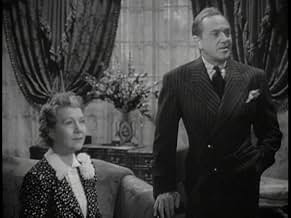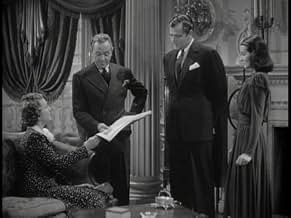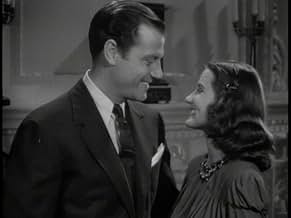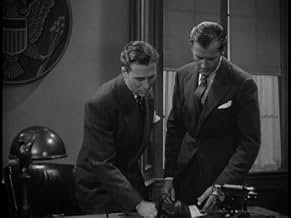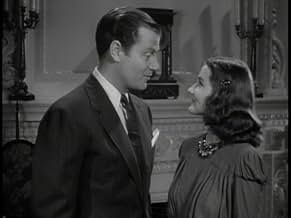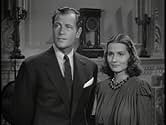जब बैरी कॉर्वल को पता चलता है कि उसकी नई दुल्हन एक संभावित दुश्मन एजेंट है, तो वह अमेरिकी औद्योगिक क्षमता को नष्ट करने की योजना बना रहे एक जासूसी गिरोह का पर्दाफाश करने के लिए राजनयिक सेवा स... सभी पढ़ेंजब बैरी कॉर्वल को पता चलता है कि उसकी नई दुल्हन एक संभावित दुश्मन एजेंट है, तो वह अमेरिकी औद्योगिक क्षमता को नष्ट करने की योजना बना रहे एक जासूसी गिरोह का पर्दाफाश करने के लिए राजनयिक सेवा से इस्तीफा दे देता है।जब बैरी कॉर्वल को पता चलता है कि उसकी नई दुल्हन एक संभावित दुश्मन एजेंट है, तो वह अमेरिकी औद्योगिक क्षमता को नष्ट करने की योजना बना रहे एक जासूसी गिरोह का पर्दाफाश करने के लिए राजनयिक सेवा से इस्तीफा दे देता है।
- पुरस्कार
- कुल 1 जीत
Rudolph Anders
- Paul Strawn
- (as Robert O. Davis)
Hans Heinrich von Twardowski
- Dr. Helm
- (as Hans Von Twardowski)
Emmett Vogan
- Instructor
- (as Emmet Vogan)
फ़ीचर्ड समीक्षाएं
Want to know how much difference a director can make? Watch this film, with Joel McCrea as a blundering American naïf in Europe on the eve of World War II exposing an Axis spy plot under the hacky direction of Lloyd Bacon, and then watch "Foreign Correspondent," which McCrea made the next year in a similar role, similar plot, at least one supporting cast member (Martin Kosleck) in common and even another sequence set during a rainstorm -- but under the direction of Alfred Hitchcock. "Espionage Agent" isn't a bad movie and it probably would be a lot more likable if McCrea hadn't made "Foreign Correspondent" (albeit playing a terminally naïve journalist instead of a terminally naïve diplomat) a year later.
Incidentally, the comment by "bkoganbing" is wrong. Though the film begins in 1915, it quickly leaps forward to 1936 (the year the Spanish Civil War broke out) and the bulk of it takes place in the late 1930's -- though, even so, the German uniforms are otherwise correct but their armbands are missing the swastika. Even after making "Confessions of a Nazi Spy" (which was about Nazi abuses in the U.S., not in their homeland), Warners was still being skittish about directly taking on the German government.
Incidentally, the comment by "bkoganbing" is wrong. Though the film begins in 1915, it quickly leaps forward to 1936 (the year the Spanish Civil War broke out) and the bulk of it takes place in the late 1930's -- though, even so, the German uniforms are otherwise correct but their armbands are missing the swastika. Even after making "Confessions of a Nazi Spy" (which was about Nazi abuses in the U.S., not in their homeland), Warners was still being skittish about directly taking on the German government.
There is little doubt in this film that World War II is about to begin. In fact, it was released just twenty-one days after the invasion of Poland by German forces and was in production long before. Scare tactics aside, the movie reveals real fears during the months preceding the war. Spies, counterspies, terror, suspicions, and other prologues to war gave ample warning of renewed global conflict. This movie reflects that warning.Viewing this film leads one to wonder, given the ample clues, how the war could surprise anyone.
Joel McCrea is a member of the foreign service who inadvertently marries a part-time spy in "Espionage Agent."
This is a very interesting film for several reasons. War is about to break out in Europe, and the U. S. is planning to stay neutral, and in fact, in one scene, an American broadcaster gives a call for neutrality.
After getting into the U. S. on a forged passport, McCrea's wife, played by the darkly beautiful Brenda Marshall, confesses her past associations, and states that she's been approached to do more favors for an espionage group. McCrea resigns his post, and with his wife's help, sets out to expose the spy network in the U. S.
In the aftermath of 9/11, watching a 67-year-old film where a group of people have agents in place throughout the country and sites ready to bomb is chilling.
There are some tense, exciting scenes and an attractive cast, but the film is more of historical interest than anything else. Look for TV Superman George Reeves in a very small, uncredited role.
This is a very interesting film for several reasons. War is about to break out in Europe, and the U. S. is planning to stay neutral, and in fact, in one scene, an American broadcaster gives a call for neutrality.
After getting into the U. S. on a forged passport, McCrea's wife, played by the darkly beautiful Brenda Marshall, confesses her past associations, and states that she's been approached to do more favors for an espionage group. McCrea resigns his post, and with his wife's help, sets out to expose the spy network in the U. S.
In the aftermath of 9/11, watching a 67-year-old film where a group of people have agents in place throughout the country and sites ready to bomb is chilling.
There are some tense, exciting scenes and an attractive cast, but the film is more of historical interest than anything else. Look for TV Superman George Reeves in a very small, uncredited role.
Joel McCrea is training for the US diplomatic service when he meets refugee Brenda Marshall and marries her. Soon. She confesses she is a low-level spy, but loves him so much that she is willing to have her secret outed. When they go to McCrea's bosses, they kick him out of the service, but he and Miss Marshall decide to do some counterspying on their own.
It's the second movie in 1939 that Warners made about the German threat. True, the country is never named, and the uniforms worn merely suggest it, but only Universal had made a stand earlier, and that went away with the Laemmles. This is quite obviously not a major production, and Warners was risking no major assets. They borrowed McCrea from Paramount, and this was Miss Marshall's first credited role. Director Lloyd Bacon obviously shot this on the cheap in his usual high-speed manner, but there's a strident call for tougher anti-espionage laws, and the Foreign Service is talked up as "America's first line of defense."
Cryptography buffs will snort when the new mechanical encryption system is talked up. It boasts over 2700 possible cyphers!
It's the second movie in 1939 that Warners made about the German threat. True, the country is never named, and the uniforms worn merely suggest it, but only Universal had made a stand earlier, and that went away with the Laemmles. This is quite obviously not a major production, and Warners was risking no major assets. They borrowed McCrea from Paramount, and this was Miss Marshall's first credited role. Director Lloyd Bacon obviously shot this on the cheap in his usual high-speed manner, but there's a strident call for tougher anti-espionage laws, and the Foreign Service is talked up as "America's first line of defense."
Cryptography buffs will snort when the new mechanical encryption system is talked up. It boasts over 2700 possible cyphers!
Joel McCrae is Barry Corvall, consulate man who gets married right as the german forces were gathering and getting ready to move on all of europe. Brenda Marshall (in her first credited role!) is "Brenda", another american needing assistance in getting back to america, but of course, she doesn't have a passport. or family. or friends. and acts a bit suspiciously (at least to everyone except Barry...) it all blows up later,and now barry must prove that his new bride hasn't committed any crime. George Reeves (Superman! ) is in here as a bit part of a secretary in the office. sadly, Reeves died young at 45, from a gunshot, under suspicious circumstances. This came out in 1939, the same year that germany rolled into poland. the U.S. would be dragged into it in Pearl Harbor, 1941. directed by Lloyd Bacon, who worked with big stars in films 42nd Street, Marked Woman, WonderBar. and even directed Lucy in two comedies. it's okay, as long as you buy into the storyline. some of it is pretty hard to buy into...but it has the gung-ho patriotic message that we will see in so many WW II films.
क्या आपको पता है
- ट्रिवियाThe working title of this picture was "Career Man". It was released little over four months after another socially conscious Warner anti-Nazi film, Confessions of a Nazi Spy (1939). This was before America's involvement in WWII, when other studios were reluctant to antagonize the Germans. Reviews compared the film to Confessions of a Nazi Spy (1939) because of its exposé about espionage. The theme of Nazi Germany trying to disable the industrial capabilities of the U.S. would be taken up again in Alfred Hitchcock's "Saboteur" (1942), after America's entry into the war.
- गूफ़George Bancroft is credited onscreen as Dudley Garrett, but radio announcer Wendell Niles introduces him as Donald Garrett.
- भाव
State Department Official: Will we in this nation ever learn the difference between tolerance and stupidity?
- कनेक्शनReferenced in Shining Through (1992)
- साउंडट्रैकI'll Sing You a Thousand Love Songs
(1936) (uncredited)
Music by Harry Warren
Dance music played after the marriage announcement
टॉप पसंद
रेटिंग देने के लिए साइन-इन करें और वैयक्तिकृत सुझावों के लिए वॉचलिस्ट करें
विवरण
- रिलीज़ की तारीख़
- कंट्री ऑफ़ ओरिजिन
- भाषा
- इस रूप में भी जाना जाता है
- Career Man
- फ़िल्माने की जगहें
- Union Station - 50 Massachusetts Avenue NE, वॉशिंगटन, कोलंबिया का ज़िला, संयुक्त राज्य अमेरिका(establishing shot - exterior - archive footage)
- उत्पादन कंपनियां
- IMDbPro पर और कंपनी क्रेडिट देखें
- चलने की अवधि
- 1 घं 23 मि(83 min)
- रंग
- ध्वनि मिश्रण
- पक्ष अनुपात
- 1.37 : 1
इस पेज में योगदान दें
किसी बदलाव का सुझाव दें या अनुपलब्ध कॉन्टेंट जोड़ें


